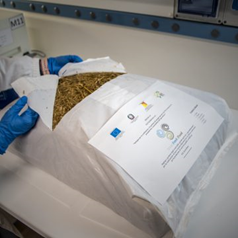SmartFeed4Food

About this good practice
The main goal of the project is to reduce fruit and vegetable waste by reusing it in the livestock sector to produce innovative silage bales. From a circular economy perspective, this approach supports lower livestock production costs, strengthens local economies, and contributes to environmental sustainability. The core innovation lies in the dynamic combination of locally produced forage with surplus or discarded fruits and vegetables, which are mixed with specific feed additives. Using a specialized pressing machine, these mixtures are compacted and wrapped in plastic film to create silage bales that preserve nutritional quality. This solution allows livestock farms to optimize cattle feed management, reducing the reliance on externally purchased raw materials and lowering feed costs. At the same time, the optimized diet has been shown to improve animal performance, contributing to better growth rates and enhanced economic outcomes for farms. Additionally, the project aims to support the organization of the meat supply chain and promote the certification of meat quality, thereby increasing market opportunities for local producers. The practice demonstrates how innovative, locally adapted strategies can tackle both food waste and input costs while boosting farm resilience and environmental outcomes.
Resources needed
Total funding 499.853 Euros
Personnel expenses 186.500 Euros (4 researchers)
External services 124.400 Euros
Consumer goods 85.453
Material Investments 49.500
General Expenses 44.500
Mission and transfers 9.500
Evidence of success
The trial showed promising results, reducing raw material purchase costs and supporting circular economy goals. The innovative silage requires no special storage and has a shelf life of up to three months at room temperature. Animals accepted the feed well, with average weight gain comparable to traditional diets. Meat quality improved, showing higher polyphenol content due to the introduction of vegetables in the feed.
Potential for learning or transfer
This practice enables farmers to optimize feed management costs by improving diet efficiency and reducing dependence on purchased raw materials. The feed change has shown positive effects on animal performance, enhancing farm profitability. The protocol is easily transferable to other regions, requiring only access to a silage bale production plant. It can also be adapted for use with different livestock species. The project successfully achieved two key outcomes: the creation of a new, easy-to-produce, and environmentally sustainable feed product, and the development of a high-quality, fully local meat. The resulting meat, characterised by its tenderness and consumer appeal, particularly among younger demographics, opens new market opportunities. The approach demonstrates how technological transfer and circular practices can support both sustainable food systems and rural economic development, offering a replicable model for similar agri-food contexts.

